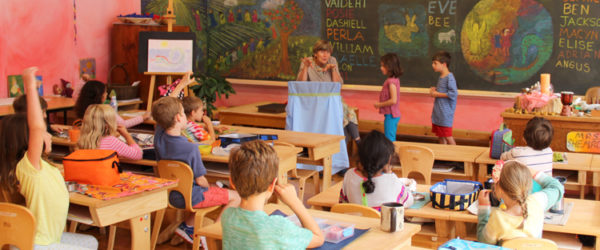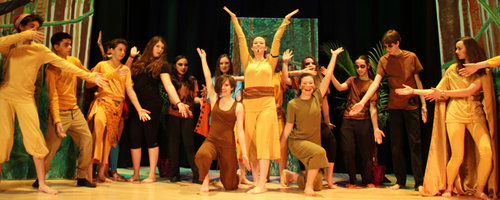Waldorf News
Why This Skeptical Engineer Trusts Waldorf Education

By Joseph Hartman, Ph.D., P.E.
As a long-time professor of industrial and systems engineering—and the parent of three children who have attended Waldorf schools—I have been asked for years about the ability of the Waldorf curriculum to produce engineers and scientists, professions that are valued in a world defined by ever advancing technology.
In 1995, I was in my third year of graduate studies at Georgia Tech, the leading school in my field. That year I also met my lovely wife Karen, who introduced me to Waldorf education. The word “skeptical” only begins to describe my reaction to a pedagogy that emphasizes movement, music, and the visual arts. But, being a curious student, I listened to Karen, attended lectures, and tried to learn. Eventually I conceded that Waldorf seemed to be a great idea, albeit only for kindergartners.
We moved to Scotland for a year and lived near a Steiner school that went through 12th grade. Again, I attended lectures and quizzed the teachers. I was shocked to discover that they taught calculus…right after poetry and before pottery. If they taught calculus, I reasoned, they had to be doing a good job teaching the fundamentals of mathematics and science.
But I still wondered how all of this “other” stuff (pottery?) helped a potential engineer or scientist. That is when I started taking a closer look at the students in my classrooms and the changing world around us.
In his best seller The World Is Flat, Thomas Friedman lays out what is necessary for students to make it in a highly connected, global community driven by technology. He does not dwell on technology skills or the ability to write computer code. Rather, he points out four survival skills:
- Learn how to learn: Seems simple, but most children are not excited about learning. For this to happen, a teacher must awaken the child. Looking back, we remember our favorite teachers because they got us excited about learning. The subject matter taught by a great teacher is immaterial, as it is easily forgotten. Rather, the desire to acquire new knowledge is what is learned and retained.
- Be curious: Curiosity and passion are just as important, if not more important than intellect. As the technology writer Doc Searls said, “Work matters, but curiosity matters more. Nobody works harder at learning than a curious kid.”
- Play well with others: You must play with others, as the people skills can never be out-sourced, even in a flat world.
- Exercise the right side of the brain: Put simply, “do something you love to do because you will bring something intangible to it.”
Note that the above skills have nothing to do with calculus or trigonometry. Rather, they have everything to do with a love of learning and exploration—cornerstones of Waldorf education.

Elementary classrooms at the Waldorf School of Lexington are bright, colorful, and uncluttered. Teachers bring the curriculum to life with vibrant, full-color chalk drawings, dramatic story-telling, and movement. What you won’t find in a Waldorf classroom are computers, iPads, electronic white boards, or other electronic devices.
Friedman goes on to describe the transformation at my alma mater, Georgia Tech. Then-president G. Wayne Clough realized that some of the best engineers “might not be the ones who could solve the calculus equation better, but they could define the problem that the calculus had to solve better than anyone else.” More importantly, “they knew how to think creatively.”
So, beginning in the late 1990s, Georgia Tech changed its admissions process to admit more students that played musical instruments, sang in a choir, or played on a team. The result is that a computer science student at Tech is likely to be taking a course in computer graphics while studying Hamlet in Classics. Echoed by Charles Vest, former president of MIT, “the humanities, the arts, and social sciences are essential to the creative, explorative, open-minded environment and spirit necessary to educate the engineer of 2020.”
The fact is, a well-rounded student who exercises both sides of the brain is more apt to be creative and curious. This is the type of engineer that I hope I am, the type of engineer I want to work with, and the type of student I want to teach. This is the son or daughter I want to have. This is why I trust Waldorf education. Educating the whole child works in any world, for any eventual profession. I can only hope that some of these children show up in my class someday, eager to learn.
Dr. Hartman’s youngest child currently attends the Waldorf School of Lexington. He is Dean, Francis College of Engineering, University of Massachusetts, Lowell.
From the Waldorf School of Lexington.

The 8th grade musical at WSoL.
 Bay Area Teacher Training
Bay Area Teacher Training Immersive Academics and Arts
Immersive Academics and Arts ~ Ensoul Your World With Color ~
~ Ensoul Your World With Color ~ Summer Programs - Culminating Class Trips
Summer Programs - Culminating Class Trips The Journey is Everything
The Journey is Everything Apply Today: New Cohort Starts Nov. 2025
Apply Today: New Cohort Starts Nov. 2025 Waldorf-inspired Homeschool Curriculum
Waldorf-inspired Homeschool Curriculum Waldorf EC Training & Intensives in Canada
Waldorf EC Training & Intensives in Canada Discovering the Wisdom of Childhood
Discovering the Wisdom of Childhood Quality Education in the Heartland
Quality Education in the Heartland Art of Teaching Summer Courses 2025
Art of Teaching Summer Courses 2025 Full-Time Teacher Education
Full-Time Teacher Education Grade Level Training in Southern California
Grade Level Training in Southern California Association for a Healing Education
Association for a Healing Education Caring for All Stages of Life
Caring for All Stages of Life Transforming Voices Worldwide
Transforming Voices Worldwide The Art of Administration and Leadership
The Art of Administration and Leadership Everything a Teacher Needs
Everything a Teacher Needs Flexible preparation for your new grade
Flexible preparation for your new grade Jamie York Books, Resources, Workshops
Jamie York Books, Resources, Workshops Train to Teach in Seattle
Train to Teach in Seattle Roadmap to Literacy Books & Courses
Roadmap to Literacy Books & Courses Storytelling Skills for Teachers
Storytelling Skills for Teachers Dancing for All Ages
Dancing for All Ages Space speaks. Its language is movement.
Space speaks. Its language is movement. Middle School Science With Roberto Trostli
Middle School Science With Roberto Trostli Bringing Love to Learning for a Lifetime
Bringing Love to Learning for a Lifetime RSS Feeds
RSS Feeds